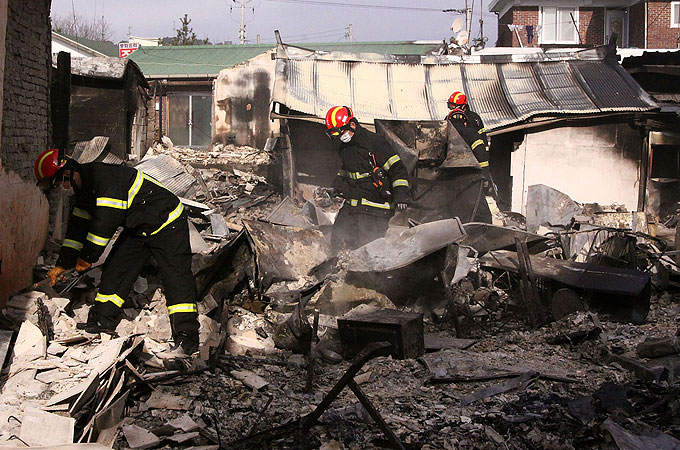Inter-Korean tension remains high
S Korea nominates new defence minister, amid reports of conflict escalation with fresh artillery fire by the North.

 |
| South Korea has ordered more troops to be deployed at Yeonpyeong island following Tuesday’s shelling [GALLO/GETTY] |
Pyongyang has warned that South Korea’s military exercises with the US would bring the two neighbours to the “brink of war”.
The stark warning came as sounds of distant artillery fire were heard from within North Korea on Friday. A Reuters witness said he saw smoke rising from inland North Korea.
South Korea’s YTN television said the shells appeared to have landed north of a disputed maritime border in North Korean waters, and the military does not believe the firing was aimed at the South.
Some South Korean legislators, meanwhile, said the military should have responded more ruthlessly, by staging an air strike on the North’s artillery batteries.
New defence minister
Meanwhile, South Korea has named its former chairman of the joint chiefs of staff as the new defence minister, amid growing criticism of the government’s response to a deadly attack by North Korea.
General Kim Kwan-jin, a 61-year-old career soldier, is replacing Kim Tae-young, who resigned on Thursday – two days after the attack on the small South Korean island of Yeonpyeong left four people, including two marines, dead.
 |
| The South Korean defence minister was held responsible for the response to the North Korean attack [AFP] |
“[We] think nominee Kim, well-respected for professionalism and conviction, is the right person for the post in order to restore trust from people and boost morale in the entire military,” Hong Sang-pyo, the presidential secretary, told a news briefing on Friday.
Earlier reports had suggested Lee Hee-Won, a security aide, would succeed Kim. But the office of Lee Myung-bak, the South Korean president, said several candidates were undergoing rigorous checks.
Kim’s appointment came hours after North Korea said that impending military exercises by the South and the United States were pushing the region towards conflict.
Al Jazeera’s Wayne Hay, reporting from Seoul, said that Kim, who is also a former army general, has “clearly been brought in to shake things up in the South Korean military”.
“He has been brought in because of his 40 years of experience in the military and strong leadership skills.”
Tit for tat
South Korean officials said Tuesday’s attack was the first shelling of civilian areas in the South since the end of the 1950-53 Korean War.
The government said it would increase troops near the disputed sea border off its west coast following the attacks.
The military in Seoul said it will revise its rules of engagement to respond more strongly to North Korean attacks in the future.
But North Korea’s KCNA news agency said Pyongyang will launch more attacks if South Korea continues with “reckless provocations”.
“[North Korea] will wage second and even third rounds of attacks without any hesitation, if warmongers in South Korea make reckless military provocations again,” the agency said, quoting from a military statement.
China’s reaction
Meanwhile, China’s prime minister has called on all sides to observe “maximum restraint” over renewed tensions on the Korean peninsula.
Wen Jiabao, in the first highest-level Chinese response to North Korea’s attack, said that China opposes military provocations in any form.
“China has all along devoted itself to maintaining the peninsula’s peace and stability, and opposed military provocations in any forms,” he said during a visit to Russia on Wednesday.
“All concerned parties should exert maximum restraint, and the international community should make more efforts conducive to easing up the tensions,” Wen said in remarks posted on the Chinese foreign ministry’s website.
China has been careful not to mention North Korea by name or assign blame for Tuesday’s attack, in keeping with its status as North Korea’s most important ally.
China has long propped up the Pyongyang leadership, worried that a collapse of the North could bring instability to its own borders.
Beijing is also wary of a unified Korea that would be dominated by the United States, the key ally of the South.
The deaths of civilians have added to anger in South Korea.
“If China does not put public pressure on North Korea, provocations by North Korea will continue,” South Korea’s Chosun Ilbo newspaper said.
“If the Korean peninsula is in flames, Chinese prosperity will shake from the bottom.”